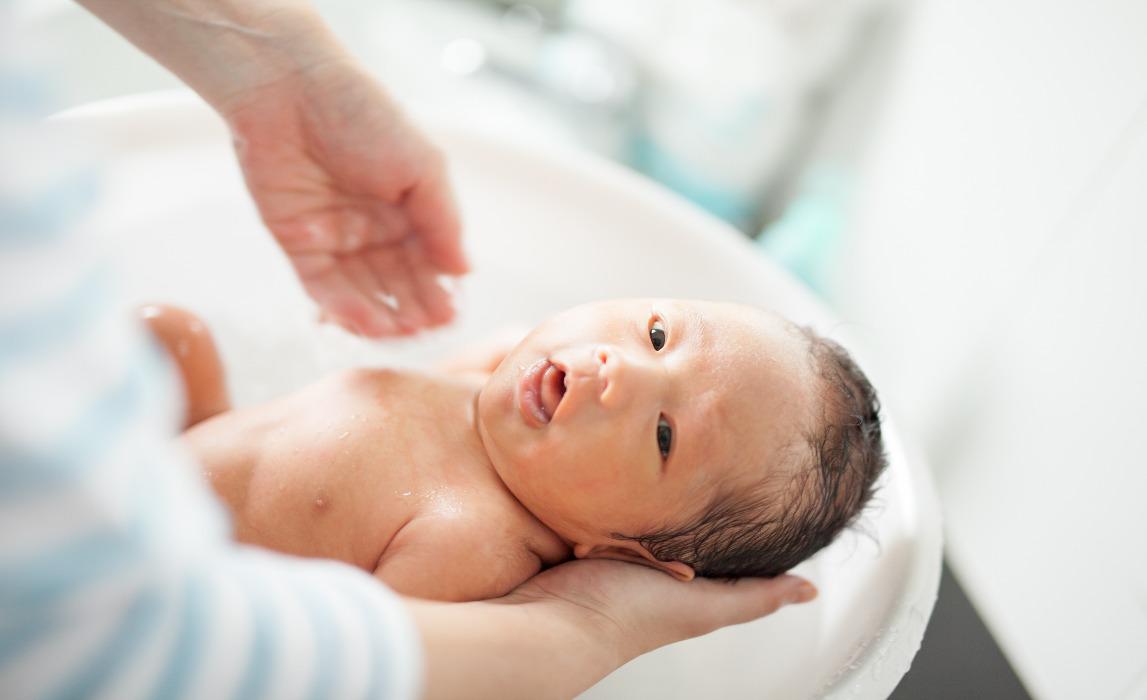N/A

Over the past few years, we have seen a dramatic rise in the number of babies who suffer from atopic dermatitis—both in Vietnam and around the world. Recently we have noticed more and more babies coming to our clinic with severe and hard-to-control eczema.
We know that genetics plays an important role in the development of atopic dermatitis. If there is a family history of atopic conditions (such as eczema, asthma, hayfever or food allergies in close relatives) the baby will have an increased risk of developing atopic dermatitis, as well as other atopic conditions. About 30% of babies who suffer from atopic dermatitis will also have food allergies that may exacerbate their skin inflammation.
Many children with atopic dermatitis, however, don’t have a family history of atopy—which means genetics are not the only culprit. We know that there are many environmental factors that can affect the development of skin inflammation:
- Formula feeding (vs breastfeeding)
- Child birth via Cesarean section (vs natural delivery)
- Overuse of antibiotics early on in life
- Vitamin D deficiency
All of these are risk factors in developing atopic conditions. Environmental pollution also plays a significant role in triggering eczema, asthma and allergies.
It is a known fact and a daily reality to anyone who has been living in Vietnam for a while that our environment is becoming more and more polluted, especially in major cities like Ho Chi Minh City, Hanoi and Da Nang. When we think about pollution, we usually think about what we see, hear, smell and breathe outside—mainly air pollution, noise, waste, garbage and plastic. We forget to look inside our homes.
It May be in the Water
One of the key factors in triggering atopic dermatitis is water pollution. The same water that reaches our sinks, baths and showers; the water we use to cook with and wash our dishes with is also used to wash ourselves and our babies. It’s the same as the water in our swimming pools. What do we know about this water, and about what it may contain? And how might it affect us?
Several studies have been done to investigate the effects of “hard water” on our skin. “Hard water” is water that contains high levels of calcium, calcium carbonate, chlorine, magnesium and other heavy metals. This water usually has high pH levels, while our skin is mildly acidic (low pH). A few studies have been conducted on adults with and without a predisposition to atopy. The results showed that using “hard water” disturbs proteins and the bonds between skin cells, damaging the skin barrier as a result and leaving it prone to colonization and penetration by pathogenic bacteria and other harmful toxins. This triggered an inflammatory response—the eczema. This damage was most pronounced in people with a genetic predisposition to atopy, but also occurred in non-predisposed people.
Another study done on infants showed that babies who lived in areas with high levels of calcium carbonate in the water were more likely to develop eczema.
Urban Development and Water
The pace of urban development in Vietnam is rapid. The astonishing increase in new residential and commercial projects, buildings, apartments, offices and malls is staggering. You can find numerous projects that contain over thousands of apartments and shops, creating very crowded living areas. Urban populations are expanding as more people immigrate to the big cities. This inevitably results in a drastic increase in water demand and an urgent need to build a vast water supply system quickly. On the other hand, Vietnam’s water resources are not infinite. In fact, they are probably gradually shrinking. More sources of water (rivers, lakes and reservoirs) are becoming polluted, and more and more households find themselves without easy access to clean water.
These factors combined will affect the quality of water that reaches our homes. It may compromise the ability to adequately control the water quality in water reservoirs and water pump stations; It may force contractors to use inferior water pipes and water systems. All these factors adversely affect the quality of water in our homes.
If your baby suffers from atopic dermatitis that is hard to treat; if his skin gets better every time you travel or go on vacation, then the culprit may be hiding in your shower. Check your home water quality in a reliable laboratory. If you can’t, try using distilled bottled water for a few weeks for bathing—it might help improve your child’s (and your own) skin condition.
Dr. Jonathan Halevy, Head of Pediatrics, Family Medical Practice Ho Chi Minh City
 Chúng tôi sử dụng cookies để cải thiện trải nghiệm của người dùng khi truy cập trang web này
Chúng tôi sử dụng cookies để cải thiện trải nghiệm của người dùng khi truy cập trang web này